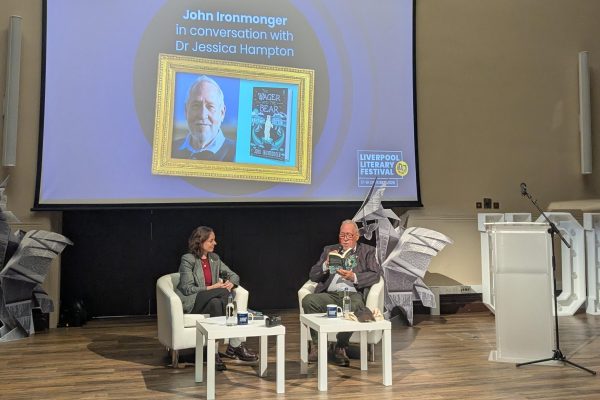6th November 2023
Listen
Listen

Running from the 17th of to the 18th of October, the Liverpool Literary Festival 2025 welcomed literary lovers to talks and readings from a range of writers, recognising and celebrating the power of books and literature. On Saturday morning, I headed to the Victoria Gallery and Museum to attend the talk for John Ironmonger’s latest work.
Interviewed by eco-linguist Dr Jessica Hampton, Ironmonger discussed his new novel The Wager and the Bear, which, like his previous work, considers the greatest story of our time, the climate crisis. Speaking as a zoologist, Ironmonger highlighted his appreciation and knowledge of the natural world and introduced the context of the book, explaining how as a climate crisis novel, The Wager and the Bear naturally takes place over a whole lifetime. After introducing the two main characters – Tom, a young idealist, and Monty, a conservative politician – Ironmonger read an excerpt from the book, giving an insight into the twists and turns of the novel, as well as the complexities of the two protagonists. Hampton underlined these complexities, shedding light on how both characters have their flaws and their strengths, and even in their contradictions, similarities between them can be found.
With themes of finding common ground, the characters of this book are relevant when considering the climate crisis in real life, as we try and find unity in how we approach this problem that affects us all. Hampton highlighted the importance of the characters’ relationships with each other, as well as their relationships with place. Adding to this, Ironmonger spoke about the setting of the novel, a small Cornish town, and highlighted the themes of community and belonging, contemplating how we, as humans, relate to place and people.
Highlighting key passages in the book, Hampton underlined the importance of the descriptions of nature throughout the story, drawing attention to themes of nostalgia and memory. This led Ironmonger to stress that memories of the world as it once was are relevant when tackling the climate crisis. As we see the decline in insect populations and reach the tipping point with coral reefs, it would almost seem that we have become immune to change, despite the reality of what we’re seeing being so devastating. As Ironmonger explained, it is important to hold onto our memories and knowledge of the natural world, as this sense of nostalgia reminds us that the climate crisis threatens to degrade what we know and love about our planet.
Ironmonger concluded by explaining how The Wager and the Bear is not another gloomy piece of climate fiction laden with despairing images of wasteland. However, the book does not sugar-coat the situation either; the climate crisis is very real and complex. It is, as Ironmonger noted, the crisis of our times and we cannot ignore that, nor can our literature. The book leaves the reader to come to their own conclusion, a decision from Ironmonger that invites possibility and makes way for hope.
To read the rest of our Liverpool Literary Festival reviews please click here:
https://www.liverpoolguildstudentmedia.co.uk/category/arts-culture